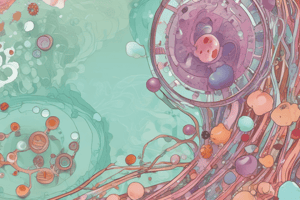Podcast
Questions and Answers
What is antimicrobial resistance?
What is antimicrobial resistance?
Antimicrobial resistance happens when germs develop the ability to defeat drugs designed to kill them.
How does antimicrobial resistance affect the response of bacteria, viruses, fungi, and parasites to medicines?
How does antimicrobial resistance affect the response of bacteria, viruses, fungi, and parasites to medicines?
Over time, these microorganisms no longer respond to medicines, making infections harder to treat.
What is the global public health impact of antimicrobial resistance?
What is the global public health impact of antimicrobial resistance?
Antimicrobial resistance is an urgent global public health threat, killing at least 1.27 million people worldwide in 2019.
How many antimicrobial-resistant infections occur annually in the U.S.?
How many antimicrobial-resistant infections occur annually in the U.S.?
Why is even resistance to one antibiotic concerning?
Why is even resistance to one antibiotic concerning?
What is the role of Clostridioides difficile in antimicrobial resistance?
What is the role of Clostridioides difficile in antimicrobial resistance?
What are some serious side effects of antimicrobial-resistant infections?
What are some serious side effects of antimicrobial-resistant infections?
What medical advances are dependent on the ability to fight infections using antibiotics?
What medical advances are dependent on the ability to fight infections using antibiotics?
What happens if antibiotics and antifungals lose their effectiveness?
What happens if antibiotics and antifungals lose their effectiveness?
How can microbes develop resistance to specific antimicrobial agents?
How can microbes develop resistance to specific antimicrobial agents?
What are some mechanisms by which microbial cells might develop resistance to antibiotics?
What are some mechanisms by which microbial cells might develop resistance to antibiotics?
Why are fungal biofilms difficult to eradicate?
Why are fungal biofilms difficult to eradicate?
Flashcards are hidden until you start studying




